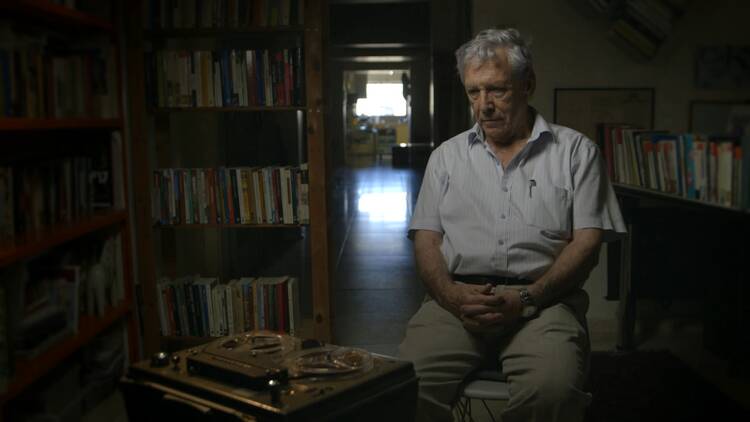“I was convinced the war was just. It was about our existence,” one says. “But then it became something else.”
For those who love Israel, especially for those whose love is best expressed in honest criticism, Mor Loushy and Amos Oz’s powerful new film, “Censored Voices,” is a profound experience. The commentary reveals, in frank interviews with the soldiers who fought the Six-Day War in 1967, the lessons which today’s Israel should well heed. The designated enemies were Egypt, Jordan and Syria, but they had not attacked. Israel’s military leadership under defense minister Moshe Dayan, because Egypt had blockaded the Gulf of Aqaba and planted tanks in the Suez zone, was convinced that an enemy attack was in the future. So Israel dove into a “pre-emptive” war. It bombed Egypt’s tanks, took the West Bank of the Jordan River, captured the Golan Heights and drove 30 miles into Syria. The West Bank’s 600,000 Arabs were now under Israeli power.
One of the soldiers in the tank attack into Syria was Amos Oz, today perhaps Israel’s greatest writer, novelist and journalist, who serves in many ways as a conscience of the country. Mor Loushy, the film’s director, remembers being taught in school that the war was Israel’s triumph over Arab nations ready to throw Israel into the sea. The people rejoiced; but a month after the war, the soldiers came home wounded and guilt-ridden and began to talk. While the population danced in the streets Oz and Loushy began the 3-year project of moving from one kibbutz to another interviewing, sometimes in small groups, veterans of the war. As the veterans listen to one another, the fear of speaking honestly disappears. Once aware of the tapes, the Israeli government censored them; but Loushy discovered a complete set hidden for 45 years and convinced the owner to let the truth be heard.
The film’s unusual structure has three components: First, there is newsreel footage, black and white and in color; parades, cheering throngs, Israelis dancing in the streets celebrating victories; Arabs driven out of their homes trekking along the highway forced to keep their hands high above their heads; Arab men blindfolded and shoved into busses to be driven who knows where; soldiers hugged by their families as they return; Arab corpses sprawled in streets and fields, shot dead, according to the soldiers, needlessly. Second, we hear the recorded voices (with sub-titles) of the soldiers themselves, though not necessarily synchronized with the images on the screen. Finally, there are the contemporary color portraits of the speakers, now old men, not speaking but staring silently into the camera, hearing their own voices from long ago.
Some words and images from the film:
- The soldiers are ordered to take groups of men out in the field and kill them. They capture Jerusalem, the Temple Mount. Some never heard of it. A “holy place?” “Judaism does not sanctify places.” Hundreds of prisoners are stripped to their underwear. They conquer Nablus, wreck and rob it, shove the inhabitants into trucks and drive them away. They had been told what “holocaust” means when applied to the Jews. Now the Jews apply it to the Palestinians. “Now we make our enemies experience what the Jews experienced in World War II.”
- The parade celebrates the conquest of the territories. They sing, “The Lord will vanquish our enemies. Praise the Lord of Israel.” On the way to battle the troops sing joyously about their coming sexual conquests. An Israeli soldier witnesses an old man, 70, being thrown out of his home, who collects his belongings into a bag and slings it over his back. The soldier weeps, saying, “It was horrifying. It turned my stomach.”
- “Zionism is a tragedy from the start. The existence of Israel depends on expelling the people who lived here. Even though I knew the war was just, I could not shake that feeling.”
- “Are we a doomed generation to make sacrifices every 10 years? Just live pauses between wars? Or are there other ways?”
- The newsreel scenes are interrupted several times with footage from the Western TV media reporting on what the reporters have witnessed. One broadcast is from a refugee camp outside Amman. We see the tents spread across the countryside. What we hear here, says the reporter, is mainly stories of brutality, prisoners forced to walk miles holding their hands in the air.
- They say, “Israel is the 51st U.S. state."
Twenty years ago I walked alone through the refugee camp outside Amman, now a mini-city of cabins and houses rather than tents. Suddenly a young man confronted me, guessing only that I was an American, and pleaded with me to take him to America. He simply presumed that I had the power to save him.
As the film concludes five of the silent survivors are given a few lines each to express their feelings on what they had re-experienced. One replied that he was becoming more conservative; another, “The society that won’t tell itself the truth is in for big trouble.”
Amos Oz has the last word: “I feel we have spoken the truth.”








